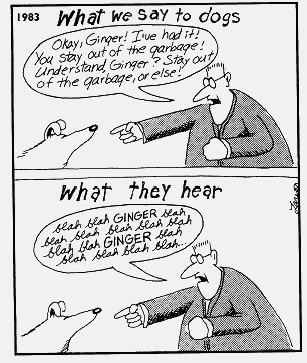A lot of what we write and say gets in the way of what we a) need to communicate, b) need to get done, or c) all of the above.
As a leader in Apple Retail for about 13 years I had the chance to fuck this up a lot, and to learn. Between countless employee mentoring, training, one-on-one sessions, talking down customers at the Genius Bar, managing lines, launches, and more, I’ve had well over 10,000 hours practicing what to say (and what not to) to get things done, or make things better.
Mostly, this means dropping verbal signales that we’re in an arugment by dropping “stop” words, and removing phrases to signal that we’re right.
When we stop trying to prove that we are right, the more others will get it right.
This is a top 5, not an exhaustive list of things we should all stop saying. If you’ve got others to add shoot me an email or add a comment.
1. But
Susan Scott agrees. When we say or write “but” that’s all the other person hears. It’s a little like this Far Side cartoon, we are to this word as Dogs are to their names. Once you say it, the phrase on either side is lost on the listener.

Instead (and this is a theme) just have two sentences separated by a period or write “and”. It’s easy. “I’m glad you were able to help that customer, but it was much harder than it needed to be.” Could be, “I’m glad you were able to help that customer. It was harder than it needed to be. Let’s figure out how to make it work better next time.” Or so.
2. Actually
The only acceptable use is something like “I can’t believe I actually did it!”. Even here it’s not really needed. “I can’t believe I did it!” works really well, maybe better.
“Actually”” is a flag that the speaker is about to correct someone. Has anyone ever said “actually” to do something other than prove someone else wrong?
Did anyone else listen or care? Or did we just write them off as a jerk?
3. In Fact
Two words to say actually. Drop this and get to the point.

4. I Understand
No you don’t.
None of us have ever felt better when someone else said it to us. So why do we say it to others?
Understanding can only be a result of listening. So listen. Then show that you listened. Then listen some more.
If you understand, address my emotion “that sounds frustrating”, “I’m sorry”, “You’re right, we can’t let this happen again”, “I can’t believe he said that”. There are a million better choices.
Demonstrate your understanding by paraphrasing: “the key thing is _____”, “next time I will _____” “the main thing we need to solve is ______” etc.
A classic case of show me don’t tell me.
5. Calm Down
Has this phrase ever accomplished what it is asking? Did yelling it work better?
Dropping just these five will help us get more of what we need done, and create better interactions. The good news is almost always they don’t even need replacing, they can just be taken away.
If this helps, or if you have other ideas, shoot me an email or leave a comment.
Good luck out there.
Ian
Learn more about me and read other bits n pieces at northwestexpeditions.com.
